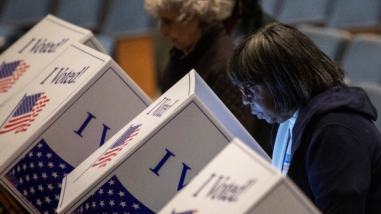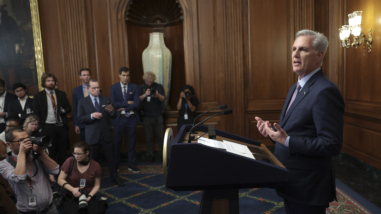Should we welcome the emergence of vape-filled rooms? (Photo Credit: Paul Hansen, licensed under CC BY 2.0)
Are democracy reformers searching in the wrong places for the solution to what ails our politics? That’s the premise of a bold stroke of a white paper entitled, “Political Realism: How Hacks, Machines, Big Money, and Back-Room Deals Can Strengthen American Democracy” from Jonathan Rauch, a senior fellow in Governance Studies at the Brookings Institution (a grantee of the Madison Initiative). I would encourage anyone concerned with the health of representative democracy in the United States to read his assessment. You may not like it—indeed, you may have a visceral reaction to the arguments Rauch presents in it—but we all need to reckon with what he and a growing number of astute observers are saying about our current quandaries.
What is political realism? Rauch observes that “above all, the realist believes in the reality of trade-offs. We live in a world of second and often third choices, and in order to govern one must make decisions and engage in practices which look bad up close and are hard to defend in public but which, nonetheless, seem to be the best alternative at the time. Always the realist asks: ‘Compared with what?’ Principles alone mean little until examined in the harsh light of real-world alternatives.”
Rauch goes on to note that political realism is a disposition akin to the realist tradition in foreign policy. Accordingly,
[I]t sees governing as difficult and political peace and stability as treasures never to be taken for granted. It understands that power’s complex hydraulics make interventions unpredictable and risky. (Banning some ugly political practice, for instance, won’t make it go away.) It therefore values incrementalism and, especially, equilibrium—and, therefore, transactional politics. If most of the players in a political system are invested in dickering, the system is doing something right, not something wrong. Back-scratching and logrolling are signs of a healthy political system, not a corrupt one.
Rauch’s argument can be read as an indictment of the progressive, populist, and libertarian reform traditions that he describes as waging an unstinting three-front war on transactional politics in the name of expanding transparency, stamping out corruption, and empowering the people (populists), meritocrats (progressives), or markets (libertarians). And surely much of the pushback on this piece will come from reformers working in these different camps.
But it won’t be sufficient for critics to dismiss Rauch as overly nostalgic for the heyday of Tammany Hall. Rauch sizes up the factors that led to the downfall of traditional machine politics and acknowledges that that the way forward is, well, forward. We still need political machines to govern, but as Rauch notes these machines need to be understood in conceptual, not historical terms: as “informal (as opposed to legally constituted) and mutually accountable hierarchies, networks, and relationships that allow politicians to organize their environment by reaching accommodations, honoring accommodations, rewarding and protecting supporters, punishing and marginalizing defectors, and exerting coordinated influence through multiple formal channels.”
Rather than trying to rehabilitate political parties or strengthening their position in our system, as some have called for, Rauch bids us to think more broadly, and with an eye to the future and the form that new machines could take. “Translating the axes of analysis from parties to machines has the advantage of putting function ahead of form; it begins by asking not what an organization or system is but what it does.” Using Rauch’s definition, not all machines need to be party organizations, and indeed not all party organizations are capable of serving as machines – just ask Speaker Boehner. But all machines do need the fuel of transactional politics and the private negotiations and deal-making that such politics entail.
Rauch is not alone in making his telling points. Another service that this paper provides is to draw together findings and observations from a growing number of leading scholars who can also be placed in the realist school of thought, or are at least fellow travelers, including Rick Pildes, Ray La Raja, Nate Persily, Bruce Cain, Frances Lee and Sarah Binder. (Full disclosure: the Madison Initiative has funded the research of La Raja, and supports research centers with which Persily, Cain, and Binder are affiliated). We have learned much from the work of each of these scholars, and trust that this paper will help their collective insights gain even more of the hearing that they warrant in the public debate.
You might be asking at this point, just how does Rauch propose that we build and fuel these modern day machines? For my part, I do wonder if the steady erosion of material incentives in American politics, i.e., the patronage jobs, pork barrel spending, and perquisites that officials enjoyed in an earlier, pre-ethics reform age, has forever limited the scope of transactional politics in our public life. Rauch does offer some preliminary suggestions that he believes hold promise, including routing more campaign finance through formal political party organizations and strengthening the hand of committee leaders and processes in Congress. And we are seeing some positive, albeit nascent developments in these areas.
But Rauch’s most pressing message is that we should begin by rethinking common reform assumptions and “argumentative defaults” that “have gone unchallenged and hardened into dogma.” For example, here at the Madison Initiative we are focused on alleviating polarization, but Rauch suggests that what Rick Pildes has termed the “fragmentation” of political leadership is actually the deeper set problem. Rauch likewise questions widely held reform imperatives such as increasing voter participation, making districts more competitive, publicly financing campaigns via small donor matching schemes, doubling down on transparency, and continuing to fight the “all-consuming, ever expanding, and by now entirely counterproductive war on corruption.” We have been pushing on these fronts for some time now. Are we better governed than before? What Rauch is ultimately saying to would-be reformers is that, given we find ourselves in a deep hole, perhaps it is time to stop digging and reconsider the problem at hand.




